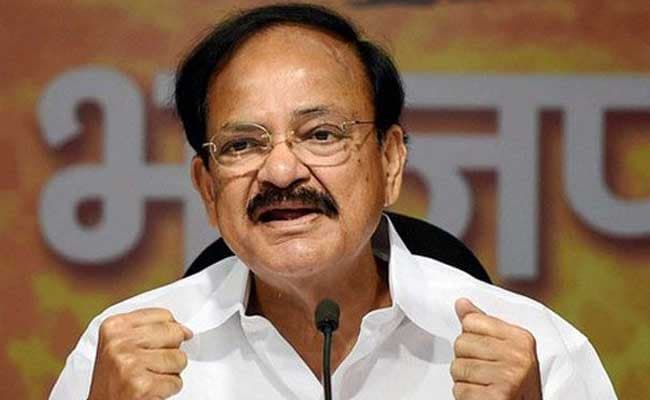
Venakiah Naidu said the demonetisation was done in secrecy so that black money hoarders couldn't get away
New Delhi:
Stressing that any shortage in supply of currency is being taken care of by the government, Union Minister M Venkaiah Naidu today said that a revolutionary step may have initial hiccups, but it gives long-term gains.
He said that the demonetisation of higher currency notes had to be implemented with all secrecy as otherwise the people would have "taken care of" their ill-gotten wealth.
"There is need for ending parallel economy. Our neighbour is hiding, abetting, funding and training terrorists. There is 20 lakh crore of rupees of counterfeit currency in India which is weakening our economy. There are also arm dealers, smugglers," he said, addressing a legislators' workshop in Delhi on infrastructure in the states.
Mr Naidu also said that the move will curb Maoist operations as they "thrive" on black money, maintaining, "Nobody is going to give money to Maoist by cheque."
"The printing of currency takes time. RBI has explained to us that the printing process takes 21 days and then transporting currency notes from the place of printing to local branches of banks takes time," Mr Naidu said on the issue of shortage of notes in ATMs.
Mr Naidu said that Prime Minister Narendra Modi has also asked the army to provide helicopters and whatever is required to airlift the money to the places witnessing shortage of notes, besides utilising banking correspondents as well as the services of post offices.
Noting that there are 82,000 bank branches in the country and two lakh ATMs, he said that the ATMS have to be recalibrated with weight, size and denomination which is "being done".
The Minister of Urban Development also said that "ultimately" common man of the country will benefit from the move that will bring "more than three lakh crore rupees" to the government.
"Thereby interest rates will be reduced, prices will be reduced, spending on the poorer will also increase, fiscal deficit will come down considerably," he said.
He said that the demonetisation of higher currency notes had to be implemented with all secrecy as otherwise the people would have "taken care of" their ill-gotten wealth.
"There is need for ending parallel economy. Our neighbour is hiding, abetting, funding and training terrorists. There is 20 lakh crore of rupees of counterfeit currency in India which is weakening our economy. There are also arm dealers, smugglers," he said, addressing a legislators' workshop in Delhi on infrastructure in the states.
Mr Naidu also said that the move will curb Maoist operations as they "thrive" on black money, maintaining, "Nobody is going to give money to Maoist by cheque."
"The printing of currency takes time. RBI has explained to us that the printing process takes 21 days and then transporting currency notes from the place of printing to local branches of banks takes time," Mr Naidu said on the issue of shortage of notes in ATMs.
Mr Naidu said that Prime Minister Narendra Modi has also asked the army to provide helicopters and whatever is required to airlift the money to the places witnessing shortage of notes, besides utilising banking correspondents as well as the services of post offices.
Noting that there are 82,000 bank branches in the country and two lakh ATMs, he said that the ATMS have to be recalibrated with weight, size and denomination which is "being done".
The Minister of Urban Development also said that "ultimately" common man of the country will benefit from the move that will bring "more than three lakh crore rupees" to the government.
"Thereby interest rates will be reduced, prices will be reduced, spending on the poorer will also increase, fiscal deficit will come down considerably," he said.
Track Latest News Live on NDTV.com and get news updates from India and around the world

